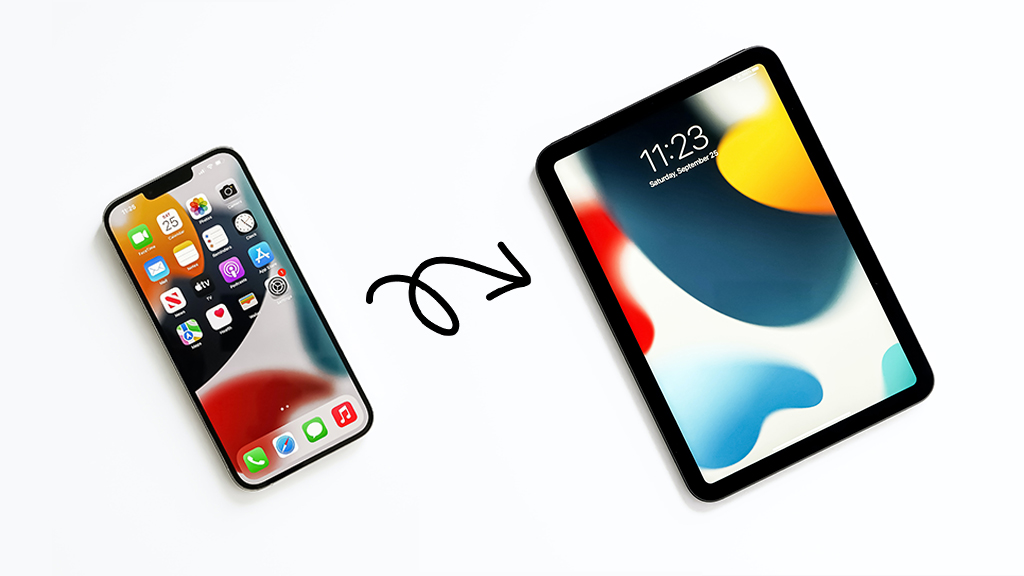How to sync iPad and iPhone seamlessly, use iCloud to keep your data updated across both devices. Ensure both devices are signed in with the same Apple ID.
Syncing your iPad and iPhone ensures seamless access to your apps, files, and settings. This synchronization helps you maintain continuity in your digital life, making it easier to switch between devices. ICloud, Apple’s cloud storage service, allows you to automatically sync contacts, photos, emails, and more.
Enabling this feature ensures your data is consistent across all Apple devices. Keeping your devices updated with the latest iOS version is crucial for smooth syncing. This process enhances productivity and keeps your digital information organized and accessible, no matter which device you are using.
How to Sync iPad and iPhone Seamlessly?

Introduction To Apple Ecosystem
Welcome to the Apple Ecosystem, where all your devices work seamlessly together. The Apple Ecosystem connects your iPad, iPhone, Mac, and other Apple devices. This connection makes it easy to share information and stay organized.
Benefits Of Device Synchronization
Syncing your iPad and iPhone offers many benefits:
- Unified Contacts: Keep your contacts updated across all devices.
- Shared Photos: Access your photos from any Apple device.
- Consistent Messages: Read and send messages on both iPad and iPhone.
- App Continuity: Start tasks on one device, finish on another.
- Backup and Restore: Automatically back up your data to iCloud.
Prerequisites For Seamless Connectivity
Before syncing, ensure the following:
- Apple ID: Use the same Apple ID on both devices.
- iCloud Account: Sign in to iCloud on both iPad and iPhone.
- Wi-Fi Connection: Ensure both devices are connected to Wi-Fi.
- Software Updates: Keep your devices updated to the latest iOS version.
- Bluetooth Enabled: Turn on Bluetooth for better connectivity.
With these prerequisites, your devices will sync effortlessly.
Setting Up Icloud On Your Devices
Syncing your iPad and iPhone is simple with iCloud. This guide will help you set up iCloud on both devices. Follow these steps to keep your data in sync effortlessly.
Creating An Apple Id
To use iCloud, you need an Apple ID. Follow these steps to create one:
- Open the Settings app on your device.
- Tap Sign in to your iPhone/iPad.
- Select Don’t have an Apple ID or forgot it?.
- Tap Create Apple ID.
- Follow the on-screen instructions to complete the process.
Make sure to use a strong password and verify your email address.
Configuring Icloud Settings
Once you have an Apple ID, you can configure iCloud settings:
- Open the Settings app.
- Tap your name at the top.
- Select iCloud.
- Toggle the switches to enable the features you want to sync:
| Feature | Description |
|---|---|
| Photos | Sync your photos and videos across devices. |
| Contacts | Keep your contacts updated everywhere. |
| Calendars | Share events and schedules across devices. |
| Notes | Access your notes on any device. |
Make sure you have enough iCloud storage for your data. You can upgrade your storage plan in iCloud settings if needed.
Understanding Icloud Services
Syncing your iPad and iPhone has never been easier with iCloud services. Apple’s iCloud offers a seamless way to manage and sync data across devices. This ensures you have access to your files, photos, and more, wherever you are.
Icloud Drive File Management
iCloud Drive is a central hub for all your files. It allows you to store, access, and manage documents across your Apple devices. This ensures your files are always up-to-date.
- Access files from any device: Open documents on your iPhone or iPad.
- Organize with folders: Create folders to keep files organized.
- Share files easily: Send files to others with just a few taps.
Photos And Icloud Photo Library
iCloud Photo Library keeps all your photos and videos safe. It syncs them across all your Apple devices.
- Automatic backup: Photos are uploaded to iCloud automatically.
- Access anywhere: View photos on any Apple device.
- Save space: Store original photos in iCloud to save device space.
With iCloud services, syncing your iPad and iPhone is simple and efficient. Enjoy your data, photos, and files wherever you are.
Syncing Email, Contacts, And Calendars
Keeping your iPad and iPhone in sync is crucial. It ensures you have access to the same information across your devices. This section will guide you on syncing email, contacts, and calendars.
Consolidating Email Accounts
First, make sure all your email accounts are set up on both devices. Follow these steps:
- Go to the Settings app on your iPad and iPhone.
- Select Mail and then Accounts.
- Tap Add Account and choose your email provider.
- Enter your login details and complete the setup.
Repeat these steps for each email account you want to sync. This way, you can read and send emails from both devices.
Managing Contacts And Calendars
Syncing contacts and calendars ensures you never miss an important date. Follow these steps:
- Open the Settings app on your iPad and iPhone.
- Select Contacts and then Accounts.
- Choose the account you want to sync.
- Toggle on the Contacts and Calendars options.
For better organization, you can use iCloud:
- Go to Settings and tap your name at the top.
- Select iCloud and toggle on Contacts and Calendars.
This way, your contacts and calendars will automatically sync across your devices.
Using Airdrop For Quick File Transfer
AirDrop is a fantastic feature for quick file transfers between iPad and iPhone. It allows you to share photos, videos, and documents wirelessly. AirDrop uses Bluetooth and Wi-Fi for fast and secure transfers.
Enabling Airdrop On Ios
Follow these steps to enable AirDrop on your iPad and iPhone:
- Open the Control Center by swiping down from the top-right corner.
- Press and hold the network settings card (where you see the airplane mode, Wi-Fi, and Bluetooth icons).
- Tap on AirDrop.
- Select Everyone to make your device discoverable to all nearby Apple devices.
Ensure that both Bluetooth and Wi-Fi are turned on. This is necessary for AirDrop to work.
Transferring Files Between Devices
Here’s how to transfer files using AirDrop:
- Open the app with the file you want to share (e.g., Photos).
- Select the file or files you want to send.
- Tap the Share icon, usually represented by a square with an arrow pointing up.
- Choose the AirDrop option.
- Select the recipient’s device from the AirDrop list.
- The recipient will receive a notification. They need to tap Accept to receive the file.
Using AirDrop is fast and secure. It ensures your files are transferred without losing quality.
Leveraging Handoff For Continuity
Handoff is a powerful feature by Apple. It lets you switch tasks easily between your iPad and iPhone. This seamless process ensures continuity in your work and play. Let’s explore how to activate and use Handoff.
Activating Handoff
To start, ensure Handoff is enabled on both devices. Follow these steps:
- Open the Settings app on your iPad and iPhone.
- Go to General and tap on Handoff.
- Toggle the Handoff switch to On.
| Device | Steps |
|---|---|
| iPad |
|
| iPhone |
|
Switching Tasks Between Ipad And Iphone
With Handoff enabled, you can switch tasks between devices.
- Start an email on your iPhone.
- Pick up where you left off on your iPad.
- Open Safari on iPad to continue browsing on iPhone.
This feature works for many apps, like Mail, Safari, and Notes. Just look for the Handoff icon on the lock screen or app switcher. Tap it to continue your task.
Syncing Messages And Calls
Syncing messages and calls between your iPad and iPhone can be very helpful. This feature ensures you never miss important conversations or calls. Learn how to set up text message forwarding and make or receive calls on both devices.
Setting Up Text Message Forwarding
Follow these steps to sync messages:
- Open Settings on your iPhone.
- Tap on Messages.
- Select Text Message Forwarding.
- Turn on the switch next to your iPad.
- You may be asked for a code. Enter the code shown on your iPad.
Now, your iPad will receive the same messages as your iPhone. This makes it easy to keep up with conversations.
Making And Receiving Calls On Both Devices
Syncing calls between your iPad and iPhone is also simple:
- Open Settings on your iPhone.
- Tap on Phone.
- Select Calls on Other Devices.
- Turn on Allow Calls on Other Devices.
- Toggle the switch next to your iPad.
Now you can make and receive calls on your iPad using your iPhone’s number. This is very useful if your iPhone is charging or out of reach.
| Action | Steps |
|---|---|
| Sync Messages |
|
| Sync Calls |
|
Syncing messages and calls ensures you stay connected on both devices. Use these simple steps to set up syncing quickly.
:max_bytes(150000):strip_icc()/002-what-you-need-to-know-to-sync-iphone-to-ipad-1999222-9cb2adef42d4493a845bbb8d7cad0872-6d1037e2d64f4a2a875dfaad7b94a2f0.jpg)
Apple Music And App Syncing
Syncing your iPad and iPhone ensures a seamless experience. This is especially true for Apple Music and apps. Keeping your music and apps in sync helps you stay organized. It also allows you to access your favorite content anytime.
Accessing Your Music Library On Multiple Devices
Apple Music makes it easy to access your music library on multiple devices. Follow these steps:
- Open the Settings app on your iPhone or iPad.
- Scroll down and tap Music.
- Toggle on Sync Library.
- Sign in with your Apple ID if prompted.
After enabling Sync Library, your music will be available on all your devices. You can listen to your favorite songs anywhere. This feature also updates your playlists and albums automatically.
Keeping App Data In Sync
Syncing app data keeps your apps up to date across devices. Here are the steps to ensure your apps stay in sync:
- Open the Settings app on your iPhone or iPad.
- Tap on your Apple ID at the top.
- Select iCloud.
- Toggle on the apps you want to sync under Apps Using iCloud.
By syncing app data, you can continue where you left off on any device. This feature is especially useful for productivity apps and games.
| Feature | Benefit |
|---|---|
| Apple Music Sync | Access your music library everywhere |
| App Data Sync | Keep app data up to date |
With these steps, your iPad and iPhone will stay in sync. This ensures a smooth and enjoyable experience.
Troubleshooting Common Sync Issues
Syncing your iPad and iPhone can sometimes pose challenges. Common issues include connectivity problems and device settings. This guide helps solve these sync issues.
Resolving Connectivity Problems
Connectivity is crucial for syncing. Ensure both devices are on the same Wi-Fi network. A stable connection is necessary.
- Check Wi-Fi settings on both devices.
- Ensure the router is functioning correctly.
- Restart the router to refresh the connection.
Bluetooth also plays a role in syncing. Ensure Bluetooth is enabled on both devices. If Bluetooth fails, try turning it off and then on again.
- Go to Settings > Bluetooth on both devices.
- Toggle the Bluetooth switch off and then on.
Resetting Devices For Better Sync
Sometimes, resetting devices helps resolve sync issues. Restarting can clear minor glitches.
- Press and hold the power button on your iPad and iPhone.
- Slide to power off.
- Wait for a few seconds and turn them back on.
Resetting network settings is another solution. This action clears saved Wi-Fi networks and passwords. Follow these steps:
- Go to Settings > General > Reset on your devices.
- Select “Reset Network Settings”.
- Reconnect to your Wi-Fi network.
Factory resetting should be the last resort. It erases all data. Backup your data before proceeding.
- Go to Settings > General > Reset.
- Select “Erase All Content and Settings”.
- Follow the on-screen instructions.
Following these steps ensures your devices sync smoothly. Happy syncing!

Maintaining Privacy And Security
Syncing your iPad and iPhone is convenient. But, maintaining privacy and security during this process is crucial. Ensuring your personal information remains safe is paramount. Here are some tips to help you.
Understanding Privacy Settings
Privacy settings protect your data. Always check your privacy settings on both devices.
- Go to Settings on your iPad and iPhone.
- Tap on Privacy.
- Review and adjust each setting.
Turn off unnecessary permissions. This limits data access to apps.
Securing Personal Data Across Devices
Keep your data safe across both devices. Use strong, unique passwords.
- Enable Two-Factor Authentication for added security.
- Go to Settings > Passwords & Security.
- Turn on Two-Factor Authentication.
Always update your devices. Updates fix security issues.
| Action | Details |
|---|---|
| Check for Updates | Settings > General > Software Update |
| Enable Auto-Update | Settings > App Store > App Updates |
Lastly, use trusted networks. Avoid public Wi-Fi when syncing devices.
Conclusion
Syncing your iPad and iPhone ensures seamless access to your data across devices. Follow the steps outlined for a smooth experience. Keep your devices updated to avoid any issues. Enjoy the convenience of having all your important information at your fingertips, no matter which Apple device you use.



